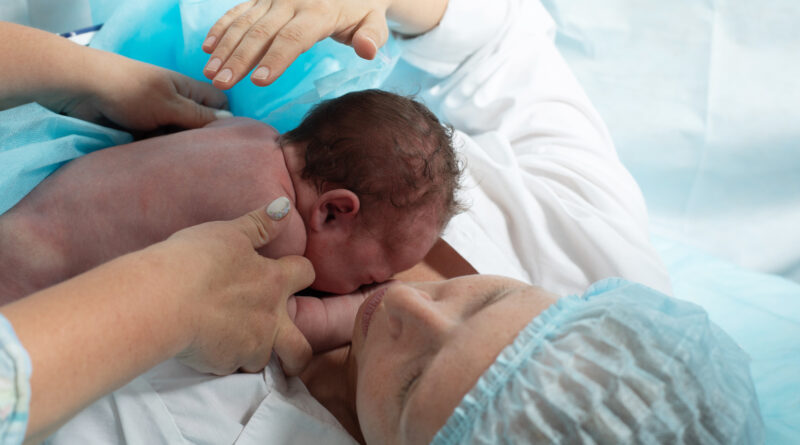Webinar: Risks, Complications and Postpartum Care of Cesarean Sections and VBACs
A cesarean section can be a life-saving procedure, but it can also lead to health problems for birthing persons and newborns. Registered Nurses in the Welcome Baby program meet with their clients just days after they are discharged from the hospital, so it’s important to know what they go through during a C-section, and what recovery entails. The RN postpartum visit/assessment is especially important for clients recovering from a C-section.
In the webinar below — hosted by LA Best Babies Network on August 16, 2023, for Registered Nurses in the Welcome Baby program, and for other staff in our network of home visiting organizations and Welcome Baby hospitals — Carmen Rezak with the Perinatal Advisory Council: Leadership, Advocacy, Consultation (PAC/LAC):
- Gives an overview of C-section and vaginal birth after cesarean (also called VBAC)
- Discusses the side effects, risks, benefits, and complications of C-sections
- Discusses alternatives to C-sections
- Reviews assessments and care
- Provides the warning and danger signs
- Discusses the follow up care with health care providers
A C-section is a surgical delivery of one or more babies through an incision in the birthing person’s abdomen and uterus. WHO recommends that C-sections be performed only when there is a medical necessity, but some birthing persons may prefer to have a scheduled C-section even though there is no medical indication and vaginal delivery is recommended.
Advantages of a C-section:
- Can be scheduled for convenience and to optimize timing of delivery
- Reduced pain of labor
- May minimize anxiety of waiting for labor to start
Possible maternal risks from C-section:
- Infection
- Blood loss/hemorrhage
- Embolism — blood clots in legs, pelvic organs, lungs (potentially life threatening)
- Injury to surrounding structures (i.e. bowels or bladder)
- Harm to uterine wall from incision
- Reaction to medication or anesthesia, especially general
- Anxiety, and post-traumatic stress disorder (PTSD). Patients also experience less acute but significant consequences: longer hospital stays, increased pain and fatigue, and slower return to normal activities.
There are also risks to the infant born through a C-section, such as increased NICU admissions, barriers to early breastfeeding support, and interference with early skin-to-skin contact.
With a vaginal birth after a C-section (VBAC) in a previous pregnancy, recovery is similar to a normal vaginal delivery. The same assessment is performed after a VBAC as after a cesarean birth.
Post-op C-section assessment:
- Adjustment to motherhood
- Bonding
- Breasts — engorgement, cracked nipples, sore, bleeding
- Breastfeeding/chestfeeding; lactation support
- Partner involvement
- Incision assessment — intact, redness, swelling, leaking, pus, foul odor, discharge
- Abdomen — distension, passing gas, bowel sounds
- Pain assessment
- Nutrition
- Bowel/Bladder – Voiding and bowel movement, last BM, constipation
- Sleep/fatigue
- PMADS
- Inspect lower extremities
Registered Nurses in the Welcome Baby program also assess for perinatal mood, anxiety, and depression (PMADs) during their postpartum visit. This is especially important if clients have experienced pregnancy loss.
About the presenter:
Carmen Rezak is a senior healthcare nurse leader with expertise in maternal-child health. Having served the greater Los Angeles area for over 30 years, she has worked as a certified Women’s Health Care Nurse Practitioner, a Perinatal Nursing Specialist, Director of Perinatal Services, and Corporate Maternal-Child Health Project Coordinator for AHMC Health Care. She has been with PAC/LAC since 2021, and is considered a pioneer in leading hospitals to promote and support breastfeeding. Specifically, she has helped four hospitals (including the first one in L.A. County) to achieve a Baby Friendly designation. Carmen is the past Board President of BreastfeedLA and is dedicated to improving the health and wellbeing of women, infants and families through quality care, outreach, and advocacy to promote and support breastfeeding and best practices. Carmen received a Master of Jurisprudence in Health Law from Loyola University Chicago and a BSN/MSN in Nursing. In 2017, she co-founded the Asian, Pacific Islander, Native Hawaiian Breastfeeding Task Force of L.A. County to improve education and support the cultural needs of breastfeeding Asian American/Pacific Islander women. Her other passion is advocating and supporting women and families experiencing perinatal mood, anxiety and depression (PMADS). She is very focused on bridging the healthcare disparity gap and helping perinatal healthcare providers learn about the impact of implicit bias, racism, and cultural humility. She is currently completing her Doctor of Nursing Practice (DNP) in Advanced Leadership in Healthcare Specialization.
Watch the webinar recording here, and don’t miss the links to related resources below:
Related resources:
- Webinar slides
- List of references and resources shared by presenter
- My Birth Matters campaign and resources to educate pregnant people about C-sections (posted in Stronger Families Blog)
- Post birth warning signs (Association of Women’s Health, Obstetric and Neonatal Nurses)
- Urgent maternal warning signs English & Spanish (CDC)
- Short-term and long-term effects of cesarean section on the health of women and children (National Library of Medicine)
- C-section facts (Cleveland Clinic)

